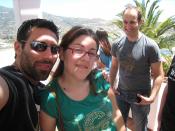Jean-Pierre Vernant's book, "The Origins of Greek Thought," is a critical reassessment of a dominant historical trope for Western antiquity: that Greek philosophy amazingly materialized out of thin air after the Dorian Invasion. As an alternative to this popular idea, Vernant rationalizes the revolution of Greek thought as it pertains to the development of the polis (city), the development of philosophy, along with the idea that logic was developed by accompanying death of the monarchy and the birth of democracy. This paper will focus on the relationship between the emergence of the polis, the origin of rational thought (logic) and its connection to the Greeks. Vernant posits that the development and expansion of the polis is diametrically related to the development of logic and philosophy.
In the first few pages of his book "The Origins of Greek Thought", Jean-Pierre Vernant maps out ways to "document the birth of rational thought."(Vernant
pg. 11) In order to do this we need to compare and contrast certain aspects of Mycenaean history, specifically the time before the Dorian invasion, and follow the trail out of The Dark Ages.
We can begin to understand the life of an ancient polis by trying to understand the religious culture inside the palace and learning why that culture failed. Early Greek philosophers were deeply concerned with the cosmos, religious myths, and science. The first known Greek scientist believed that the architect of the world and all its inhabitants were somehow connected to science and the cosmos. Thales was supposedly the first philosopher linking scientific thought to the discovery of nature, around 585 B.C. Thales and Anaximander struggled with the puzzle of the origin of the universe, what was here at the beginning, and what things are made of. Thales suggested that in the beginning there was...


